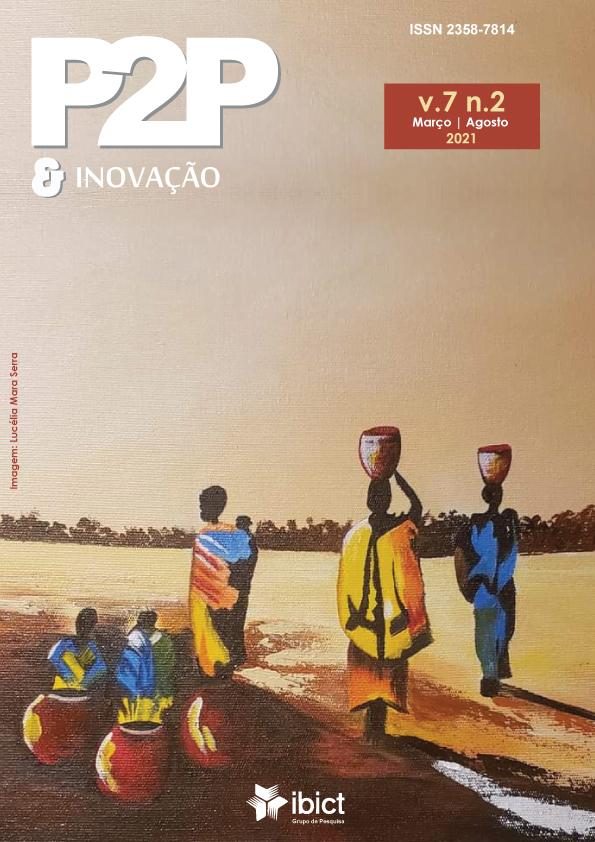Dynamic capabilities as a support tool for the digital transformation of organizations
DOI:
https://doi.org/10.21721/p2p.2021v7n2.p295-310Keywords:
Digital Transformation, Organizational Transformation, Dynamic CapabilitiesAbstract
This article aims to identify how dynamic capabilities can support organizations in the digital transformation process. This is a systematic literature review, from the Scopus and WOS databases, published in the last 10 years using as keywords the concepts "digital transformation" and "dynamic capabilities". The research sought to identify case studies with empirical evidence on the researched theme. The research shows as a result that dynamic capabilities can support organizations in the digital transformation process, to the extent that they incorporate a fundamental characteristic, which is organizational transformation, i.e., the flexibility to adapt to different ecosystems and business models, through innovation and collaboration with other institutions.
Downloads
References
AUGIER, M.; TEECE, D. J. Understanding complex organization: the role of know-how, internal structure, and human behavior in the evolution of capabilities. Industrial and Corporate Change, v. 15, n. 2, p. 395–416, 2006.
BARNEY, J. Firm resources and sustained competitive advantage. Journal of management, v. 17, n. 1, p. 99–120, 1991.
BHAMRA, R.; DANI, S.; BURNARD, K. Resilience: the concept, a literature review and future directions. International Journal of Production Research, v. 49, n. 18, p. 5375–5393, 2011.
BRYNJOLFSSON, E.; HITT, L. M. Beyond computation: Information technology, organizational transformation and business performance. Journal of Economic perspectives, v. 14, n. 4, p. 23–48, 2000.
DABAB, M.; WEBER, C. Business Intelligence and Data Analytics as a Driver of Dynamic Capability Strategic Approach. 2018 PORTLAND INTERNATIONAL CONFERENCE ON MANAGEMENT OF ENGINEERING AND TECHNOLOGY (PICMET). Anais...IEEE, ago. 2018
DE MENDONCA, C. M. C.; DE ANDRADE, A. M. V. Microfoundations of dynamic capabilities and their relations with elements of digital transformation in Portugal. (L.-T. A. G. R. Rocha A. Cota M.P., Ed.) IBERIAN CONFERENCE ON INFORMATION SYSTEMS AND TECHNOLOGIES, CISTI. Anais...IEEE Computer Society, 2018
DUGSTAD, J. et al. Towards successful digital transformation through co-creation: alongitudinal study of a four-year implementation of digital monitoringtechnology in residential care for persons with dementia. BMC Health Services Research, v. 19, jun. 2019.
FITZGERALD, M. et al. Embracing digital technology: A new strategic imperative. MIT sloan management review, v. 55, n. 2, p. 1, 2014.
HESS, T. et al. Options for formulating a digital transformation strategy. MIS Quarterly Executive, v. 15, n. 2, 2016.
HSU, C.-C.; TSAIH, R.-H.; YEN, D. C. The Evolving Role of IT Departments in Digital Transformation. Sustainability, v. 10, n. 10, out. 2018.
KONLECHNER, S.; MÜLLER, B.; GÜTTEL, W. H. A dynamic capabilities perspective on managing technological change: a review, framework and research agenda. International Journal of Technology Management, v. 76, n. 3/4, p. 188, 2018.
LIU, D.-Y.; CHEN, S.-W.; CHOU, T.-C. Resource fit in digital transformation Lessons learned from the CBC Bankglobal e-banking project. Management Decision, v. 49, n. 9–10, p. 1728– 1742, 2011.
PORTER, M. E.; HEPPELMANN, J. E. How smart, connected products are transforming competition. Harvard business review, v. 92, n. 11, p. 64–88, 2014.
RIERA, C.; IIJIMA, J. The Role of IT and Organizational Capabilities on Digital Business Value. Pacific Asia Journal of the Association For Information Systems, v. 11, n. 2, p. 67– 95, jun. 2019.
ROGERS, D. L. The digital transformation playbook: Rethink your business for the digital age. [s.l.] Columbia University Press, 2016.
SÁNCHEZ, M. A. A framework to assess organizational readiness for the digital transformation. Dimensión Empresarial, v. 15, n. 2, p. 27–40, 2017.
SÁNCHEZ, M. A.; ZUNTINI, J. I. Organizational readiness for the digital transformation: a case study research. Revista Gestão & Tecnologia, v. 18, n. 2, p. 70–99, 29 jun. 2018.
TEECE, D. J. Business models and dynamic capabilities. Long Range Planning, v. 51, n. 1, p. 40–49, 2018.
TEECE, D. J. Dynamic capabilities and entrepreneurial management in large organizations: Toward a theory of the (entrepreneurial) firm. European Economic Review, v. 86, p. 202– 216, 2016.
TEECE, D. J. Explicating dynamic capabilities: the nature and microfoundations of (sustainable) enterprise performance. Strategic management journal, v. 28, n. 13, p. 1319– 1350, 2007.
TEECE, D. J.; PISANO, G.; SHUEN, A. Dynamic capabilities and strategic management. Strategic management journal, v. 18, n. 7, p. 509–533, 1997.
TEECE, D.; PISANO, G. The dynamic capabilities of firms: an introduction. Industrial and Corporate Change, v. 3, 1994.
TEECE, D.; PISANO, G.; SHUEN, A. Dynamic capabilities and strategic management. Strategic Management Journal, v. 18, 1997.
TORRES-CARRIÓN, P. V. et al. Methodology for Systematic Literature Review applied to Engineering and Education. IEEE Global Engineering Education Conference (EDUCON), p. 1370-1379, 2018.
VIAL, G. Understanding digital transformation: A review and a research agendaJournal of Strategic Information Systems, fev. 2019.
WARNER, K. S. R.; WÄGER, M., Building dynamic capabilities for digital transformation: An ongoing process of strategic renewal. Long Range Planning, v. 52, n. 3, p. 326–349, 2019.
Downloads
Published
Issue
Section
License
The journal is published under the Creative Commons - Attribution - Noncommercial - Share Alike 3.0 Brazil.
The published work is considered collaboration and therefore the author will not receive any remuneration for this as well as anything will be charged in exchange for publication.
All texts are responsibility of the authors.
It’s allowed partial or total reproduction of the texts of the magazine since the source is cited.














